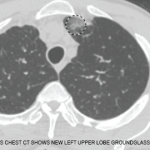Identifying the efficacy of abatacept treatment for GCA is the goal of a randomized controlled trial whose preliminary results were reported at the ACR/ARHP Annual Meeting this past fall.2 Forty-one patients were randomized to receive abatacept or placebo, in addition to prednisone according to standardized taper schedule. At the end of the study, 48% of patients in the abatacept group remained relapse free compared with 31% of patients in the placebo group. “In the back of our minds, we are thinking that tocilizumab and abatacept could be used as important treatment options for refractory GCA and, potentially, could have a larger role in the initial treatment of disease,” Dr. Chung said.
GPA, Churg-Strauss Targeted in Preliminary Studies
Another severe life-threatening vasculitis is granulomatosis with polyangiitis (GPA) (previously called Wegener’s granulomatosis). There is a clinical need to identify more targeted, less toxic remission-induction therapies, as well as to find ways to optimize the use of currently approved therapies, she said. “We were hoping that rituximab, which has been approved for GPA, would be a safer medication for these patients. Unfortunately, past studies have suggested that the rate of infection for rituximab is the same as for the other remission induction therapies we use.”
A pivotal study is MAINRITSAN, which showed that rituximab was useful for maintaining remission in patients with GPA.3 However, every patient in MAINRITSAN who received rituximab received the same dose at the same frequency, Dr. Chung said. MAINRITSAN-2, currently underway, is examining whether using biomarkers to guide the frequency of administering rituximab will result in improved outcomes. Primary completion is expected for August of this year. “In many ways, rituximab has revolutionized treatment of GPA. But the question remains: What is the best way to use this medication?” she noted. “Can lab tests like ANCA or CD-19 counts tell us when to re-dose patients to maintain their remission?”
Another clinical need in GPA is for medication that can be used to treat less severe disease. “We can use cyclophosphamide or rituximab to treat life-threatening GPA, but these medications have toxicities,” said Dr. Chung. “Can we find less toxic medications to treat disease manifestations that are not life threatening?” To address this need, abatacept is being studied in the ABROGATE clinical trial for treatment of relapsing, non-severe GPA. Sixteen sites across North America are enrolling patients for this trial, including UCSF, where Dr. Chung is the site investigator.
A third vasculitis discussed by Dr. Chung is Churg-Strauss syndrome (CSS), also known as eosinophilic GPA. “There has been no therapy directly studied for remission induction or maintenance in Churg-Strauss syndrome,” she said. “Truly, there is no strong evidence supporting the use of any medication for this disease, and no true steroid-sparing effect has been documented for these patients, most of whom are steroid dependent.” Given the success of rituximab with GPA, a retrospective study of rituximab from earlier this year offers observational support for its use in CSS/EGPA.4


